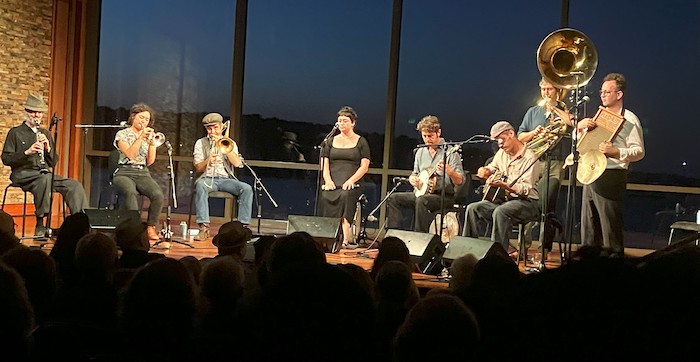Concert Review: Tuba Skinny — Creating Traditional Jazz Anew
By Steve Provizer
The 8-piece band Tuba Skinny is one of the most entertaining purveyors of early New Orleans and ’20s Chicago jazz around.

Tuba Skinny at Rockport Music’s Shaolin Liu Performance Center. Photo: Steve Provizer
For all the statistical evidence of jazz’s demise, the music endures. Contemporary high school and college ‘stage bands’ (an early, more acceptable euphemism for “jazz” bands) continue to play ’50s Count Basie charts. Repertory bands revisit the early work of Duke Ellington. Small groups pay homage to John Kirby’s powerhouse swing sextet. Instrumentalists continue to memorize Charlie Parker and Dexter Gordon solos and people are still blowing “free” a la Ayler and late Coltrane. And, even more anachronistic, sounds laid down in early New Orleans and ’20s Chicago can still be heard throughout the land.
One of the most entertaining purveyors of traditional jazz is Tuba Skinny, a band I heard at the Shaolin Liu in Rockport on September 1. The persistence and expertise of this 8-piece band has taken it from performing on the streets of New Orleans to undertaking world tours.
The genesis of the group goes something like this: In the early 2000’s, post-Katrina, musicians who played in various troupes on the streets of New Orleans decided to start a string band; it was called the Dead Man Street Orchestra. The band played Cajun folk music, gypsy music, Balkan melodies, and “old-timey” music. They played in Jackson Square and other spots and eventually undertook what they called “boxcar tours” to the East and West Coasts.
When the band broke up, several members joined the group Loose Marbles; essentially a pool of musicians who gigged around the city. This group decided to form a band to play early, or “Trad” jazz, which the members considered to be the “most accessible form of music.” These were cornetist Shaye Cohn, trombonist Barnabus Jones, guitarist Kiowa Wells, and tuba player Todd Burdick. The band adopted the name Tuba Skinny because a passerby used to call out “Hey, Tuba Skinny” to the slender Burdick as he cycled down the street with his sousaphone. The remark was a humorously sly reference to New Orleans musician Anthony “Tuba Fats” Lacen.
The group worked up a repertory of tunes by Louis Armstrong, Jelly Roll Morton, Bunk Johnson, George Lewis, Jim Robinson, the Mississippi Sheiks, Sam Morgan’s Jazz Band, Johnny and Baby Dodds, Blind Blake, Blind Boy Fuller, the Memphis Jug Band, King Oliver, and Bessie Smith. This, supplemented by some original tunes, constituted the material they played in Rockport.
At the Shaolin Liu, Cohn was on cornet, Jones on trombone, and the clarinetist was Craig Flory. The group was rounded out by tuba player Riley Goodemote, guitarist/banjoist Max Bien-Kahn, Greg Sherman on guitar and vocals, vocalist-bass drummer Erika Lewis, and Robin Rapuzzi on washboard.
Shaye Cohn is the leader, drawing up a set list and subtly sending solo and arrangement signals to the band. Like the rest of the group, Cohn is from somewhere other than New Orleans. In fact, Bostonians may be familiar with her dad, the guitarist Joe Cohn. Jazz fans will certainly know her grandfather, saxophonist/arranger Al Cohn. Shaye came late to the trumpet; initial training was in classical piano. In fact, she didn’t take up the cornet until about 2010. At this point, she handles the horn expertly. She’s clearly listened to Bix, but also to King Oliver, as her mute work demonstrates.
Every member of the band is both musical and technically adept. Clarinetist Flory reminded me of Pee Wee Russell in his idiosyncratic approach, if occasionally dipping into the Stovepipe school. Trombonist Jones is well-schooled in the Kid Ory style. Rapuzzi is virtuosic on the washboard and Bien-Kahn acquitted himself well as an accompanist and soloist. Lewis and guitarist Sherman delivered vocals with panache, although there was some noise in the sound (I think their voices could have been better equalized for the house).For this concert, the group drew from a range of sources, including songs by the Memphis Jug Band, Duke Ellington, Clarence Williams, Elmore James, and Jelly Roll Morton. Originals by band members, including Erika Lewis’ “Glow Worm Wobble” and Bien-Kahn’s “It Gets Easier” were in keeping with the spirit of this source material.
The rhythm section was solid, and the group played with assurance at any tempo, from Ellington’s slow “Saturday Night Function” to Jabbo Smith’s “Jazz Burner” (even if they didn’t quite get it up to the fiery tempo of the original).
Tuba Skinny is a paradox: this is a well-oiled machine that feels, in performance, as if it has been thrown together at the last minute. Not because the band sounds haphazard but because, even in tunes with complex arrangements, it remains loose-limbed and relaxed. The spirit of the music is not just imitated — it is created anew.
Steve Provizer writes on a range of subjects, most often the arts. He is a musician and blogs about jazz here.
Tagged: Barnabus Jones, Kiowa Wells, Shaye Cohn, Todd Burdick

